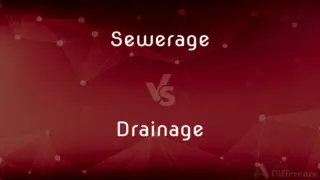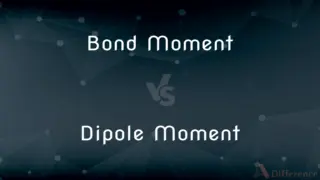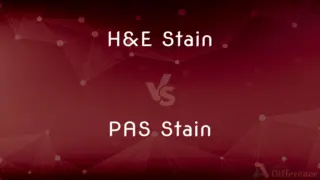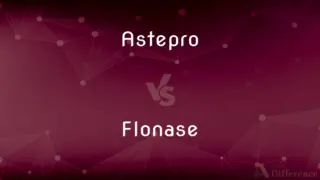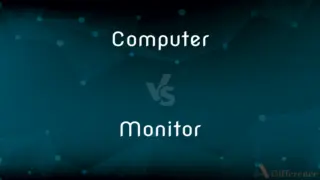Little vs. A Little — What's the Difference?
By Tayyaba Rehman — Published on December 15, 2023
"Little" implies an almost negligible amount; "A Little" suggests a small but possibly sufficient amount.
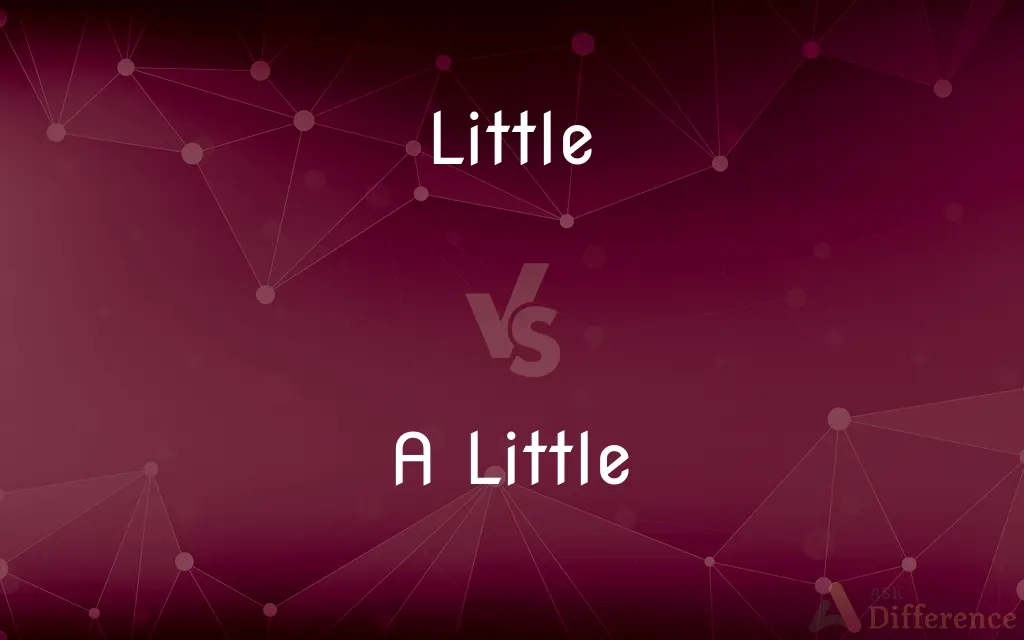
Difference Between Little and A Little
Table of Contents
ADVERTISEMENT
Key Differences
"Little" is a term that is often used to express a negligible or insufficient amount of something. When someone says there's "little hope," it typically indicates a pessimistic viewpoint, suggesting there's hardly any hope at all. Conversely, "A Little" is more neutral or sometimes optimistic, implying that while the quantity is small, it's still present and might be enough. For instance, "a little hope" signifies that hope exists, even if it's not abundant.
The nuances between "Little" and "A Little" can profoundly impact the tone and meaning of a statement. "Little" generally conveys a more negative sentiment. For example, stating "there's little water left" would imply there's not enough to meet the need. On the flip side, "A Little" conveys a more positive or neutral sentiment. Saying "there's a little water left" suggests there's still some water available, albeit not much.
In terms of grammar, "Little" and "A Little" are both quantifiers. They describe the amount of something, especially when that something is uncountable. However, the presence of the article "a" in "A Little" makes a significant difference in meaning. While "Little" focuses on the scarcity of something, "A Little" emphasizes its presence, even if it's in a minimal quantity.
In daily communication, understanding the difference between "Little" and "A Little" is crucial. "Little effort" and "a little effort" might seem close, but the former suggests almost no effort, while the latter implies some effort was made. Similarly, "little interest" means almost no interest, but "a little interest" suggests a minimal yet existing interest.
Distinguishing between "Little" and "A Little" is essential for effective communication. These terms, though seemingly similar, can convey different shades of meaning, changing the essence of what's being communicated. The choice between them should be deliberate, reflecting the exact sentiment one wishes to express.
ADVERTISEMENT
Comparison Chart
Connotation
Negative (insufficiency)
Neutral or Positive (some amount)
Presence of Article "A"
Absent
Present
Meaning
Almost none
Some, even if not much
Example (Water)
"There's little water left." (Almost none)
"There's a little water left." (Some remains)
Usage with Uncountable Nouns
Describes a negligible amount
Describes a small but existing amount
Compare with Definitions
Little
Signifying a very small amount.
There's little time left for preparation.
A Little
Denoting a small amount that exists.
A little effort can make a big difference.
Little
Expressing insufficiency or scarcity.
Little knowledge can be a dangerous thing.
A Little
Expressing a quantity that is small but present.
I want a little more time to decide.
Little
Used to minimize the importance or size of something.
It's of little consequence to the overall project.
A Little
Representing a degree or amount that's not significant but not negligible.
She showed a little reluctance at first.
Little
Representing something limited in magnitude.
He has little patience for mistakes.
A Little
Indicating a trace or slight amount.
There's a little truth in his story.
Little
Small in size
A little dining room.
A Little
Referring to some quantity, even if minimal.
I have a little money saved for the trip.
Little
Small in quantity or extent
A little money.
A little work on the side.
Little
Short in extent or duration; brief
There is little time left.
Little
Unimportant; trivial
A little matter.
Little
Narrow; petty
Mean little comments.
A little mind consumed with trivia.
Little
Having scant power or influence; of minor status
Just a little clerk in the records office.
Little
Being at an early stage of growth; young
A little child.
Little
Younger or youngest. Used especially of a sibling
My little brother is leaving for college next week.
Little
Not much; scarcely
Works long hours, sleeping little.
Little
Not in the least; not at all
They little expected such a generous gift.
Little
A small quantity or amount
Give me a little.
Little
Something much less than all
I know little of their history.
Little
A short distance or time
A little down the road.
Waited a little.
Little
Small in size.
This is a little table.
Little
Insignificant, trivial.
It's of little importance.
Little
(offensive) Used to belittle a person.
Listen up, you little shit.
Little
Very young.
Did he tell you any embarrassing stories about when she was little?
That's the biggest little boy I've ever seen.
Little
(of a sibling) Younger.
This is my little sister.
Little
(often capitalized) Used with the name of a place, especially of a country or its capital, to denote a neighborhood whose residents or storekeepers are from that place.
Little
(derogatory) To imply that the inhabitants of the place have an insular attitude and are hostile to those they perceive as foreign.
Little
Having few members.
Little herd
Little
Operating on a small scale.
Little Steel (smaller steel companies, as contrasted with Big Steel)
Little Science (science performed by individuals or small teams, as contrasted with Big Science)
Little
Short in duration; brief.
I feel better after my little sleep.
Little
Small in extent of views or sympathies; narrow; shallow; contracted; mean; illiberal; ungenerous.
Little
Not much.
This is a little known fact.
She spoke little and listened less.
We slept very little last night.
Little
Not at all.
I was speaking ill of Fred; little did I know that he was right behind me, listening in.
Little
Not much, only a little: only a small amount (of).
There is (very) little water left.
We had very little to do.
Little
Not much; not a large amount.
Little is known about his early life.
Little
A small amount.
Can I try a little of that sauce?
Little did he do to make me comfortable.
If you want some cake, there's a little in the refrigerator
Many littles make a mickle. (Scottish proverb)
Little
A child; particularly an infant.
Little
A newly initiated member of a sorority, who is mentored by a big.
Little
The participant in ageplay who acts out the younger role.
Little
(countable) One who has mentally age regressed to a childlike state.
Little
Small in size or extent; not big; diminutive; - opposed to big or large; as, a little body; a little animal; a little piece of ground; a little hill; a little distance; a little child.
He sought to see Jesus who he was; and could not for the press, because he was little of stature.
Little
Short in duration; brief; as, a little sleep.
Best him enough: after a little time,I'll beat him too.
Little
Small in quantity or amount; not much; as, a little food; a little air or water.
Conceited of their little wisdoms, and doting upon their own fancies.
Little
Small in dignity, power, or importance; not great; insignificant; contemptible.
When thou wast little in thine own sight, wast thou not made the head of the tribes?
Little
Small in force or efficiency; not strong; weak; slight; inconsiderable; as, little attention or exertion;little effort; little care or diligence.
By sad experiment I knowHow little weight my words with thee can find.
Little
Small in extent of views or sympathies; narrow; shallow; contracted; mean; illiberal; ungenerous.
The long-necked geese of the world that are ever hissing dispraise,Because their natures are little.
The men, and the women, and the little ones.
Little
That which is little; a small quantity, amount, space, or the like.
Much was in little writ.
There are many expressions, which carrying with them no clear ideas, are like to remove but little of my ignorance.
Little
A small degree or scale; miniature.
A little, to or in a small degree; to a limited extent; somewhat; for a short time. " Stay a little."
The painter flattered her a little.
Little
In a small quantity or degree; not much; slightly; somewhat; - often with a preceding it.
Little
A small amount or duration;
He accepted the little they gave him
Little
Limited or below average in number or quantity or magnitude or extent;
A little dining room
A little house
A small car
A little (or small) group
A small voice
Little
(quantifier used with mass nouns) small in quantity or degree; not much or almost none or (with `a') at least some;
Little rain fell in May
Gave it little thought
Little hope remained
Little time is left
We still have little money
A little hope remained
A little time is left
Little
Of short duration or distance;
A brief stay in the country
In a little while
It's a little way away
Little
Not fully grown;
What a big little boy you are
Small children
Little
(informal terms) small and of little importance;
A fiddling sum of money
A footling gesture
Our worries are lilliputian compared with those of countries that are at war
A little (or small) matter
Mickey Mouse regulations
A dispute over niggling details
Limited to petty enterprises
Piffling efforts
Giving a police officer a free meal may be against the law, but it seems to be a picayune infraction
Little
(of a voice) faint;
A little voice
A still small voice
Little
Younger brother or sister;
Little brother
Little
Lowercase;
Little a
Small a
E.e.cummings's poetry is written all in minuscule letters
Little
Small in a way that arouses feelings (of tenderness or its opposite depending on the context);
A nice little job
Bless your little heart
My dear little mother
A sweet little deal
I'm tired of your petty little schemes
Filthy little tricks
What a nasty little situation
Little
Not much;
He talked little about his family
Little
Indicating an almost negligible quantity.
There's little evidence to support the claim.
Common Curiosities
Can "Little" be used with both countable and uncountable nouns?
Typically, "Little" and "A Little" are used with uncountable nouns.
Does "A Little" always indicate a sufficient amount?
Not necessarily. "A Little" means some amount exists, but it might still be insufficient.
What does "Little" typically imply?
"Little" usually suggests a negligible or almost nonexistent amount.
How does the tone change between "I have little hope" and "I have a little hope"?
The former is more pessimistic (almost no hope), while the latter suggests some hope exists.
Is "A Little" more positive than "Little"?
Yes, "A Little" is more neutral or positive, indicating some amount, even if small.
What's the main grammatical difference between "Little" and "A Little"?
The presence of the article "a" in "A Little" distinguishes its meaning from "Little."
Can "Little" emphasize the insignificance of something?
Yes, like in "of little importance," it emphasizes the lack of significance.
Does "Little" always have a negative connotation?
Often, but not always. Context matters.
Is "A Little" always used to describe positive situations?
No, it simply suggests some amount or degree, which can be in positive, negative, or neutral contexts.
Can "A Little" refer to a short duration?
Yes, like in "Wait a little longer."
Are "Little" and "A Little" interchangeable?
No, they convey different shades of meaning and aren't typically interchangeable.
Why is the distinction between "Little" and "A Little" important?
The choice between them can change the meaning and tone of a statement.
Do both "Little" and "A Little" relate to size or amount?
Yes, both terms relate to size or amount, but with different implications regarding quantity or degree.
Can "Little" mean "young" in certain contexts?
Yes, like in "little brother," where "Little" means younger.
In which situations is "A Little" preferred?
When indicating the presence of a small but existent amount or degree.
Share Your Discovery

Previous Comparison
Discrete Variable vs. Continuous Variable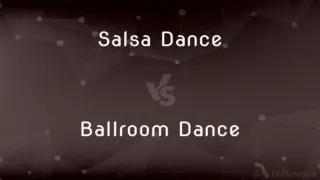
Next Comparison
Salsa Dance vs. Ballroom DanceAuthor Spotlight
Written by
Tayyaba RehmanTayyaba Rehman is a distinguished writer, currently serving as a primary contributor to askdifference.com. As a researcher in semantics and etymology, Tayyaba's passion for the complexity of languages and their distinctions has found a perfect home on the platform. Tayyaba delves into the intricacies of language, distinguishing between commonly confused words and phrases, thereby providing clarity for readers worldwide.















